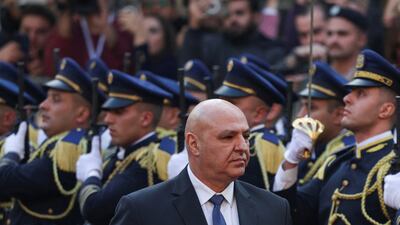The election of Joseph Aoun as Lebanese President was hardly a surprise. In recent months, the political situation in Lebanon and Syria had led major regional and international countries with an interest in Lebanon’s affairs to arrive at a consensus that what was needed was a head of state who reflected the new realities in the country.
The President will certainly have much on his plate. More significantly, he will have to deal with a political class that eyes him warily, given that he has influence over the one national institution the sectarian politicians don’t really control: the armed forces. What worries them more is that Mr Aoun will also benefit from the leverage of foreign backing.
However, there is a broader narrative that has accompanied Mr Aoun’s rise and election, one that tells us a great deal about Lebanon itself and its dangerous dysfunction – a dysfunction that ultimately may have existential implications for the Lebanese state.
This dysfunction has been visible in the fact that Lebanon today finds itself under effective foreign trusteeship. Mr Aoun was imposed by the five-nation contact group that had been involved for two years in trying to persuade the Lebanese to elect a president. The group consists of the US, Saudi Arabia, France, Qatar and Egypt. In the past week, Saudi, US and French envoys were in Beirut saying they endorsed Mr Aoun’s election.
While there was much commentary about the fact that the Parliament Speaker Nabih Berri and Hezbollah, as well as the Maronite Christian politician Gebran Bassil, might not support Mr Aoun, most of this was noise. It was clear from the start that if the US and Saudi Arabia were behind the armed forces commander, there was little his local rivals could do to stop his election, given the leverage the group of five has on a vulnerable Lebanon. All the opponents could do was play difficult in order to extract concessions for allowing Mr Aoun’s election.
This Lebanese vulnerability was the natural outcome of political leaders and parties that have steadily pushed their country into debilitating stalemate and ruin, while allowing Hezbollah to enter into a devastating conflict with Israel.
Financially and economically, Lebanon has been bankrupt for the past five years, with no effort made to introduce reforms, even as international organisations have repeatedly urged the politicians to do so. If the country remained under foreign eyes in its political and security dimensions – whether from Iran or the five-nation group of states – its economy was being scrutinised by international financial institutions, such as the International Monetary Fund and World Bank.
In this context, we can assume that Mr Aoun, for all his credibility, will pay the price for Lebanon’s reckless abandonment of its political and financial sovereignty. The President will be obliged to implement a road map his foreign backers will present to him. This includes implementation of UN Resolution 1701, which calls for Hezbollah’s disarmament south of the Litani River, and perhaps UN Resolution 1559, which seeks to disarm all non-state actors in Lebanon.
If Mr Aoun fails to do this, Israel will retain the option to intervene itself. Yet all that would mean is that Lebanon remains a weak and dependent country that merits no better than de facto foreign control. Neither Mr Aoun nor the political class wants that to happen, as the latter’s biggest fear is to see policies imposed on it from outside that erode its control.
In that regard, Mr Aoun may have little choice but to push harder for economic reforms, as well. International financial institutions have sounded the alarm on Lebanon’s cash economy, and without reforms it's doubtful other countries will help finance Lebanon's reconstruction after the conflict with Israel. A largely impoverished public is unlikely to side with a political class that has blocked all measures helping to reimburse them for their losses from the collapse in 2019.
Mr Aoun’s victory is really that of the institution he headed until last week: the armed forces. As countries look at Lebanon, what they see is one institution that has more or less managed to resist the rot of the civil service, while retaining broad sectarian backing. That may explain why an armed forces commander was selected yet again as President, while civilian politicians are regarded as weak, lowest-common-denominator candidates for the presidency.
What does the future hold for the Lebanese state? The post-war order starting in 1990 was really little more than a transposition of the civil war’s political structure to peacetime. In the same way the militia leaders ran Lebanon during the conflict, they did so after it ended – in the process dividing the state pie among themselves and plundering its limited resources.
Mr Aoun might not be able to fundamentally change this, but he could become a lever allowing Lebanon’s re-engaged outside patrons to impose some change in the country’s political and financial order. Whether he or they succeed or not is another matter, but Lebanon’s continued existence would be under threat if the status quo persists. The country is losing its youth at a blinding pace, a haemorrhaging that no country can long endure.
The election of Mr Aoun, while encouraging, has laid bare Lebanon’s deep discontent. Today the country has nothing resembling sovereignty, and its future will largely be defined by outsiders. For many Lebanese, that may be a relief, seeing as those who control politics have bled the country dry, robbed people of their savings, and carried Lebanon into unnecessary wars. The country must find its way out of this deplorable situation quickly if it is to survive.
Can Mr Aoun make this happen? Given the myriad obstacles he will face, we can only hope.


